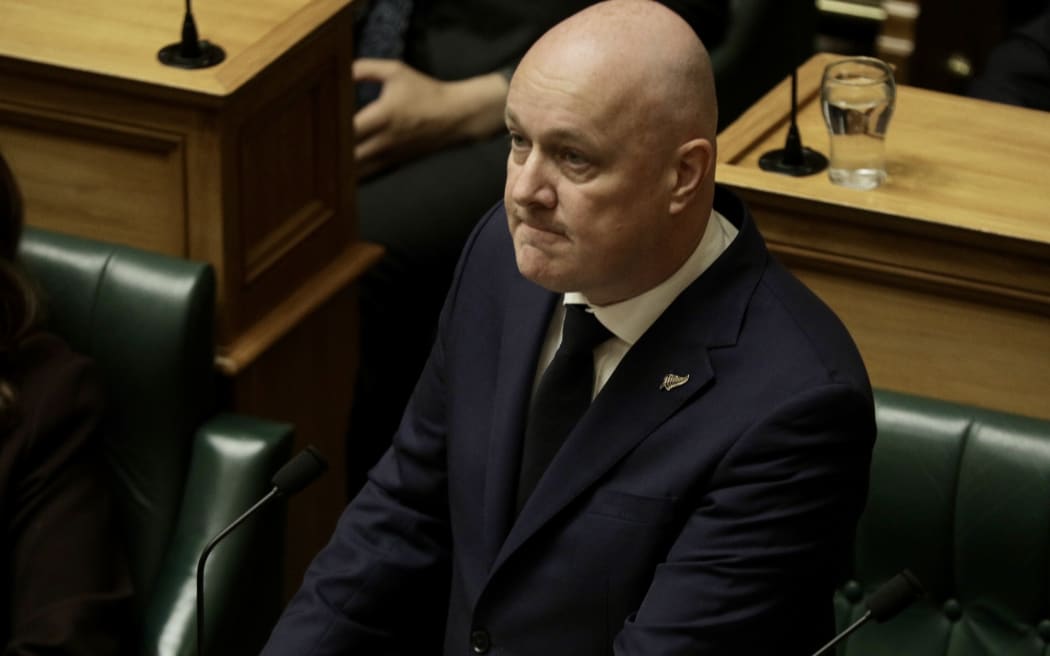
During an apology to survivors in November, Prime Minister Christopher Luxon announced $32 million to support existing schemes while the coalition ironed out details of the new redress system. Photo: Reece Baker/RNZ
An announcement on the government's long-awaited abuse in care compensation scheme is imminent, RNZ understands.
The government has repeatedly promised to announce its plans for a new single redress system before this year's budget and, with less than a fortnight until Budget Day, time is running out.
The Abuse in Care Royal Commission of Inquiry found up to 200,000 people had been abused, and even more neglected, by the state and faith-based institutions between 1950 and 2019.
Its final report, released last July, outlined 138 recommendations to right the wrongs of the past and to ensure the safety of every child, young person and adult in care today.
In 2021, the inquiry made 95 recommendations for establishing an independent, fair and effective redress scheme for all survivors of abuse in state and faith-based care with existing schemes to be phased out.
The then-Labour government made little progress on the recommendations before losing the 2023 election.
During November's apology to survivors, Prime Minister Christopher Luxon announced $32 million to support existing schemes while the coalition ironed out details of the new redress system.
"I know that financial redress is important to many of you, and no amount of money will ever make up for what you have endured, but today I want to provide you with some details around the next steps," Luxon told survivors in parliament on 12 November.
"Many of you do not want to engage with it as it currently exists. Some parts of it are 20 years old and it can take up to five years for your claims to be addressed. But there are also over 3,500 of you engaging with the current system. So today I am announcing the government will invest an additional $32 million to increase capacity in the current system while we work on the new redress system.
"This funding will increase resources and help ensure the system is more responsive to your needs. But I want to assure you it is our intention to have a new single redress system operating next year."
He also promised to pressure faith-based organisations to take part.
"The government has written to church leaders to let them know our expectation is that they will do the right thing and contribute to the redress process," Luxon said.
A mish-mash of compensation schemes had been run by the Ministries of Education, Health, Social Development and Oranga Tamariki, with survivors paid an average of about $18,000 for abuse inflicted while in care.
In 2022, the Ministry for Social Development began offering payments of up to $30,000 under a Rapid Payment Framework to survivors who were seriously ill, aged 70 or older, and those with the oldest claims.

Outside Parliament some people put up white crosses to represent patients from Lake Alice who did not live to see November's apology. Photo: Giles Dexter/RNZ
Survivors of torture at Lake Alice Hospital's child and adolescent unit were an outlier to other claimants with an average payment of $68,000, then last December, the government announced a group of 77 survivors were eligible for a rapid payment of $150,000.
Details surrounding faith-based institutions were murkier, however, the Catholic Church paid an average of $30,000 (with the highest $152,000), the Anglican
Church also averaged $30,000 (with the highest $100,000) and the Salvation Army averaged $29,000 (with the highest $91,500).
The Royal Commission said payments were "too low to provide meaningful puretumu torowhānui (holistic redress)".
"Payments by state and faith-based institutions do not, in our view, amount to meaningful redress," the commissioners said.
"We have already described the considerable range in payments by state agencies - anywhere from $1,000 to $90,000 in the case of the Ministry of Social Development, although the average is a modest $20,000. The Ministry of Health average is $6,000, and the Ministry of Education average is $15,300. These figures are very low compared with payments by overseas schemes."
The figures fell well short of comparable schemes in Australia where survivors received an average of $84,000; Canada at $104,000; and Ireland at $98,000 (all in New Zealand dollars).
Since 2017, Australian survivors who had sought justice through the courts had received hundreds of thousands and even millions of dollars in compensation.
Survivors were anticipating meaningful changes to redress in New Zealand with sufficient compensation to provide for their well-being, while also ensuring faith-based institutions were held to account for the abuse they failed to prevent and often covered up.
However, the government had already promised a tight budget with new spending slashed from $2.4 billion to $1.3 billion.
"We have debt at levels not seen since the mid-1990s. We're running one of the biggest deficits in the world," Finance Minister Nicola Willis said, last week.
"That's the difference between what we're earning and what we're spending. That can't go on forever."
Whatever shape redress took it was bound to come as a disappointment for some survivors.
Sign up for Ngā Pitopito Kōrero, a daily newsletter curated by our editors and delivered straight to your inbox every weekday.





